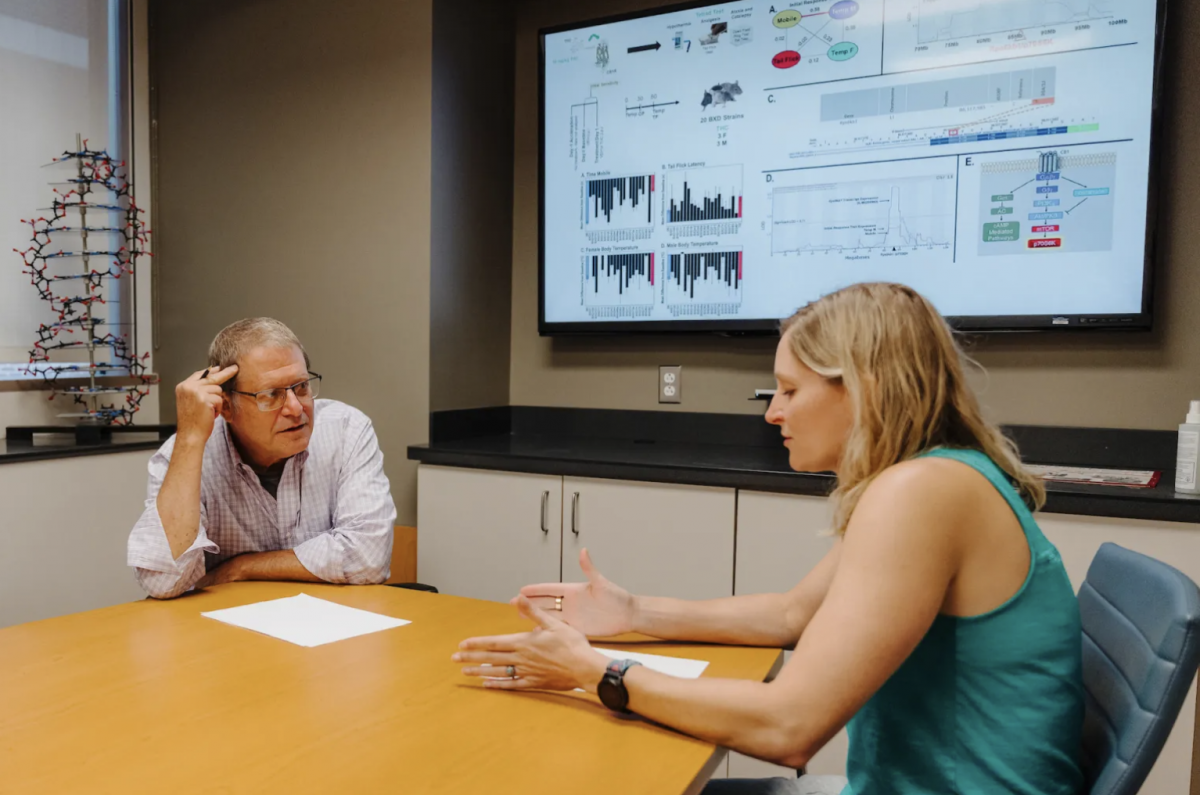Cannabis hits everyone a little differently, doesn’t it? A shared bowl of the same bud can produce varying effects in those sitting on the same couch. Why?
That (and a whole lot more) is exactly what researchers at the University of Tennessee Health Science Center (UTHSC) want to find out. Now armed with a $3.7 million grant from the National Institute on Drug Abuse, they’ll begin to unravel how genetic differences in animals change how tetrahydrocannabinol (THC) — the major psychoactive component in cannabis — affects them differently.
The study, the first of its kind, is led by Bob Moore, PhD, a professor in the Department of Pharmaceutical Sciences, and Megan Mulligan, PhD, associate professor in the Department of Genetics, Genomics, and Informatics. Drs. Xusheng Wang, Byron Jones, and Rob Williams are assisting in the research. UTHSC provides facilities, resources, and administrative staff, and the school invested pilot-project funding.
The team wants the research to ultimately help those consuming cannabis. Do gene variants put some at risk for unwanted side effects? Can the research be used to create new cannabis-based therapies?
We caught up with Mulligan to help us better understand the project. — Toby Sells
Memphis Flyer: Can you briefly (and plainly) explain what this research project is about?
Megan Mulligan: The goal of our research project is to identify gene variants that contribute to individual differences in the physiological response to high-dose THC. These gene variants could make individuals more or less sensitive to therapeutic or harmful effects of THC.
To do the research, we will measure THC response in a genetically diverse population of rodents. In response to THC, both humans and rodents experience a drop in body temperature (hypothermia), reduced activity (hypolocomotion), and are less sensitive to pain or annoying stimuli (antinociception).
Just like humans, some rodents in this population are more or less sensitive to THC. For example, some rodents may show only a slight reduction in activity when given THC, while others might not move at all.
We can score the response of each individual in the genetic population and then identify which regions of the genome contain genetic changes that are shared by individuals with similar responses to THC. This will be the first study to identify gene variants that cause differences in response to THC. This type of study has not been done before in humans or rodents.
How did you get the idea to do this project?
Changes in regulatory policy and public attitudes towards cannabis have resulted in increased cannabis use. Recreational use is now legal in 23 states.
At the same time the levels of THC in cannabis and derived products have tripled. On average, 3 percent in dried cannabis in the 1980s [is] up to 15 percent today and even up to 30 percent for some strains. Extracts and edibles can contain as much as 50 percent and up to 90 percent THC.
We have a very poor understanding of how individual genetic variation impacts health benefits of THC or the risk of adverse health consequences following use of high-potency products that contain large amounts of THC.
This project was inspired by the urgent need to better understand the range of individual variation in THC response and to identify gene variants and biological signaling pathways that mediate differential sensitivity to THC.
What do you hope to find out?
Although some of the targets of THC in the body are known, we have yet to characterize all of the genes and signaling pathways impacted by THC.
Moreover, cannabis-derived products like THC and the biological signaling pathways that respond to them are now being explored as therapeutics or therapeutic targets to treat neurodegenerative diseases, pain, metabolic disorders, drug dependence, and anxiety, to name just a few.
At the same time, THC, especially in high doses, can have adverse health consequences. These include acute impairments in perception, memory, and motor skills, and cognitive impairments, psychosis, use disorders, withdrawal symptoms, and hyperemesis syndrome in some individuals following chronic use.
The goal of our study is to identify the gene variants and biological signaling pathways that make individuals respond differently to THC. This information could then be used to identify individuals who might be at risk for side effects or negative health consequences of THC use or to identify signaling pathways that could be therapeutically targeted to treat pain or disease.
How will the results change the cannabis industry, or products, or cannabis policy? What could change with your results?
Consumers need accurate information about the composition of products and potential health risks. Our study does not directly address these issues.
It is our opinion that learning more about the targets of THC in the body and the contributions of genetic variation to THC response are part of a broader research effort to better inform the public about the risks of high-potency THC use and will ultimately contribute to changes in policy and the development of cannabis-derived therapeutic products.
